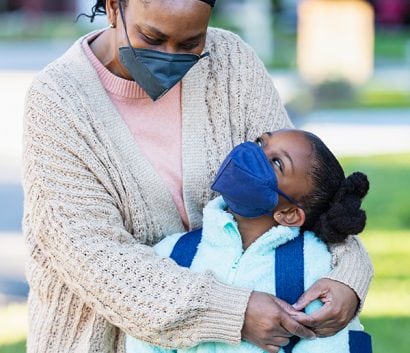Key points
- Long COVID is a serious illness that can result in chronic conditions requiring comprehensive care and may cause disability.
- Long COVID symptoms may resolve months after illness for some people, while others may experience symptoms for years.
- Anyone who gets COVID-19 can experience Long COVID, including children.
- Talk to your healthcare provider if you think you have, or your child has, Long COVID.
- Resources are available to help you or someone you care about manage Long COVID.
How Long COVID impacts daily life
Experiencing or caring for someone with Long COVID can be confusing, challenging, and frustrating. About 1 in 4 adults with Long COVID have reported experiencing significant limitations in their daily activity. People experience Long COVID in different ways and may:
- Feel shame or isolation about their condition or experiences
- Develop entirely different symptoms compared to others
- Experience more severe health problems compared to others
Taking steps to listen to a person's lived experience and talking with compassion can help you better understand and address their needs. CDC's How Right Now campaign provides helpful tools for navigating these types of conversations with empathy.
Long COVID as a disability
Research shows that people who develop Long COVID may experience new or ongoing symptoms that can significantly affect their daily activities. These symptoms can cause health complications that can even result in a disability. Resources are available.
Did you know?
Caring for children, including adolescents, with Long COVID
Although Long COVID appears to be less common in children than in adults, children can develop Long COVID. Recognizing and identifying Long COVID symptoms can be difficult, especially for children. Young children may have even more trouble describing the symptoms or problems they are experiencing. The best way to prevent your child from developing Long COVID is to protect them from getting COVID-19.
Long COVID can affect your child’s daily activities

If your child has Long COVID, it may impact their ability to attend school, complete schoolwork, or participate in other normal activities such as:
- Sports and recreational activities
- Social gatherings or activities (for example, afterschool events)
- Child care
School administrators, counselors, teachers, and nurses can work with families and healthcare professionals to provide learning or other accommodations for children with Long COVID. Resources are available to you and your child.
Caring for adults with Long COVID
Research shows adults are more likely than children to get Long COVID. Long COVID symptoms and conditions can affect adults' ability to perform many of their normal daily activities and cause physical, emotional, and financial stress.
The unknown and long-term nature of Long COVID can worsen this stress. Taking steps to understand the patient's unique experiences might make them feel less isolated.
Long COVID impact on the workforce

Some estimates suggest that more than 1 million U.S. adults are out of work at any given time due to Long COVID. Additional impacts of Long COVID for adults in the workforce include:
- Reduced ability to work full time
- Increased healthcare costs
- Food and housing financial hardship
- Increased risk for developing functional disabilities
Long COVID can reduce your ability to work
Resources are available for employees and employers to better understand how Long COVID may affect them or their work.
Help Manage Long COVID
Everyday strategies
Long COVID is different for everyone, and people experiencing Long COVID may find different activities, treatments, or strategies to be helpful. Some people find journaling about their Long COVID symptoms and what makes them better or worse to be helpful, but you should use whatever strategies work best for your health. There are support groups that can help people experiencing Long COVID and their caregivers. Talk to your healthcare provider about creating a personal medical management plan to help improve your symptoms and quality of life.
Talking to your doctor

Long COVID is a complex chronic illness with symptoms that can be difficult to understand, talk about, or explain. People with these hard-to-explain symptoms may:
- Be misunderstood
- Not be taken seriously or believed
- Experience stigma from others, sometimes even from their healthcare providers
- Need to undergo several tests to determine appropriate treatment
These can cause a delay in your diagnosis and receiving the appropriate care or treatment. It is important to understand any Long COVID symptoms or conditions and to seek care to improve your quality of life. Talk to your healthcare provider if you think you or your child has Long COVID.
What to expect for your healthcare appointment
Healthcare providers are still learning about Long COVID. It may take more than one appointment to evaluate potential Long COVID symptoms and determine a helpful diagnosis. Your provider may:
- Ask questions about your medical history
- Ask about your current symptoms and quality of life
- Run tests
- Order additional tests or schedule appointments with specialists
Treatment for Long COVID is specific to management of your symptoms and may be different from others. Clinical trials are underway to learn more about how Long COVID affects different people and possible treatments. Preparing for an appointment can make a difference in your Long COVID evaluation, diagnosis, and treatment. Consider different questions about your Long COVID symptoms or conditions and review these tips [PDF – 1 Page] to help prepare for your healthcare provider appointment.
Resources
Disclaimer
Support Groups
- Long COVID Alliance
- Long COVID Kids
- Long Covid Families – Support for caregivers, children, and individuals
- Support & Connect – Bateman Horne Center
- Patient Led Research Collaborative for Long COVID
- COVID-19 Longhauler Advocacy Project
For parents or caregivers of children with Long COVID
- Department of Education's Resource to Support Children, Students, Educators, Schools, Service Providers, and Families
- Supporting Children With Long COVID to Manage Their Energy
- Long-Haul COVID-19 in Children and Teens
For employers and employees
- Supporting Employers with Long COVID: A Guide for Employers
- Accommodating Employees with COVID-19 or Long COVID
Support for caregivers
- Coping with Stress
- How Right Now
- Caring for Yourself When Caring for Another
- Services and Supports for Longer-Term Impacts of COVID-19
Disability
- Long-Term Health Effects of COVID-19: Disability and Function Following SARS-CoV-2 Infection | The National Academies Press
- Developing SSI/SSDI Applications for Individuals with Long COVID
- Guidance on "Long COVID" as a Disability Under the ADA, Section
- What You Should Know About COVID-19 and the ADA, the Rehabilitation Act, and Other EEO Laws
- Long COVID: A Guide for Health Professionals on Providing Medical Evidence for Social Security Disability Claims
